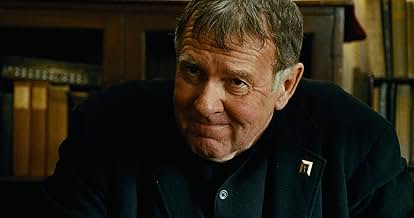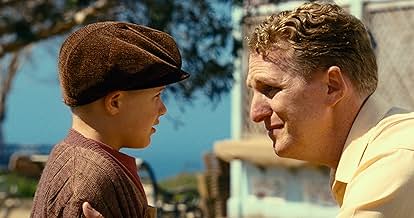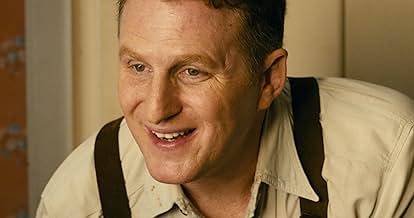ÉVALUATION IMDb
7,3/10
24 k
MA NOTE
Ajouter une intrigue dans votre langueAn eight-year-old boy is willing to do whatever it takes to end World War II so he can bring his father home. The story reveals the indescribable love a father has for his little boy and the... Tout lireAn eight-year-old boy is willing to do whatever it takes to end World War II so he can bring his father home. The story reveals the indescribable love a father has for his little boy and the love a son has for his father.An eight-year-old boy is willing to do whatever it takes to end World War II so he can bring his father home. The story reveals the indescribable love a father has for his little boy and the love a son has for his father.
- Prix
- 2 nominations au total
Ali Landry Monteverde
- Ava
- (as Ali Landry)
Andy Geller
- Dr. Foley
- (as Andrew Geller)
Barry Ford
- The Narrator
- (voice)
C.K. McFarland
- Doris
- (as CK McFarland)
Histoire
Le saviez-vous
- AnecdotesThe earthquake in the movie really happened in real life in Los Angeles three months before the bomb detonation in Hiroshima.
- GaffesWhen the mother is on the front porch reading the paper, the headline states that the Allied Leaders were meeting in "Postdam." The city hosting the meeting was "Potsdam."
- Citations
[repeated line]
James Busbee: Do you believe you can do this?
- ConnexionsReferenced in Midnight Screenings: Little Boy (2015)
- Bandes originalesHappy Days Are Here Again
Music by Milton Ager (ASCAP), Lyrics by Jack Yellen (ASCAP)
Performed by Johnny Marvin and His Orchestra, Courtesy of RCA Records
Label by arrangement with Sony Music Licensing
Used by permission. All rights controlled & administered by EMI Robbins Catalog Inc. and Advanced Music Corp (ASCAP)
Commentaire en vedette
LITTLE BOY is a decent film that I didn't know was a faith-based endeavor until people started complaining about it. Having watched and reviewed Christian films in the past (THE RELIANT, LEFT BEHIND, and THE SHACK come immediately to mind), films that objectively weren't very good, this movie didn't strike me as being a part of that melieu. It may or may not be, but it is certainly a cut above the others in terms of acting, writing, and production values. If its intent is overtly evangelical, the filmmakers did a good job of making it palateable and provide a good example of what faith films should aspire to if their real intent is outreach rather than preaching to the choir.
Nevertheless, LITTLE BOY is at the very least perceived as a Christian film, and that means it's open season for derisive and cynical critique. For example, some smugly insist, without citing any specifics, that LITTLE BOY is "historically inaccurate." Let's unpack that.
Pearl Harbor was bombed in a surprise attack on December 7, 1941 (coincidentally 81 years ago today) and, as a result, we fought a war against the Japanese in the Pacific. That's straight-up real.
Intrinsic to LITTLE BOY's plot is the notion that innocent Japanese-Americans were mistreated, stolen from, and forced into internment camps before being released penniless and without apology near the end of the War. Yes, that happened.
When these innocent Japanese-Americans were finally freed, they were hated, discriminated against, and outright abused based on the fact that they had the "face of the enemy." Check.
(The book Infamy, by Robert Reeves, covers Japanese-American internment in significant detail. I recommend it.)
In early August of 1945, we used an atomic bomb -- two of them in fact -- in Japan, and one was nicknamed Little Boy. Two cities with which we all are familiar were obliterated. Incontrovertibly true.
Americans were held as prisoners of war in the Pacific theater. Some died and some came home. Most, if not all, were brutalized. Um, yeppers.
That's literally the full extent of the history that's even touched upon in this movie, and none of it is false. Should there have been more? Should the reasons why all these things happened have been addressed? Should events have been better contextualized? Maybe, but that would have made for a very, very long and very different film.
Instead, this movie maintains its focus on the story of an American boy of the era and, as such, doesn't dwell too much on the morality, or lack thereof, of the War in the Pacific and its belligerants. Rather, it spends its time contemplating matters at home and matters of personal integrity, exploring the concept that we should treat all people with kindness and judge all as human beings based on their individual merits. Cries that this is a racist film based on the depiction of things that really happened simply don't hold up. Cries that this must be a racist film because it's connected to Christianity are even dumber and reveal more about the complainant than about the film itself.
Where LITTLE BOY fails, to the extent that it fails at all, is in its simplistic vision of a very complicated world in which faith usually doesn't move mountains but, instead, helps us to climb over them, and sometimes even then with great difficulty. Had the filmmakers resisted the urge to offer up a traditional happy ending with smiles and hugs and happy tears all around, it would have been better for the overall effort. A smidgen more imagination and, dare I say it, inspiration might have led to an uplifting ending that didn't undermine everything that preceded it.
Without doubt, LITTLE BOY sports themes rooted in faith, but that's not all there is to it. As a work of cinema, it's so much more. Still, if all viewers can bring to the party is an abiding hostility toward God, religion, and the devout, they'll miss all good stuff and will instead stretch for criticisms that are poisoned by ideology and not informed by what's actually presented. And that's really a shame.
Nevertheless, LITTLE BOY is at the very least perceived as a Christian film, and that means it's open season for derisive and cynical critique. For example, some smugly insist, without citing any specifics, that LITTLE BOY is "historically inaccurate." Let's unpack that.
Pearl Harbor was bombed in a surprise attack on December 7, 1941 (coincidentally 81 years ago today) and, as a result, we fought a war against the Japanese in the Pacific. That's straight-up real.
Intrinsic to LITTLE BOY's plot is the notion that innocent Japanese-Americans were mistreated, stolen from, and forced into internment camps before being released penniless and without apology near the end of the War. Yes, that happened.
When these innocent Japanese-Americans were finally freed, they were hated, discriminated against, and outright abused based on the fact that they had the "face of the enemy." Check.
(The book Infamy, by Robert Reeves, covers Japanese-American internment in significant detail. I recommend it.)
In early August of 1945, we used an atomic bomb -- two of them in fact -- in Japan, and one was nicknamed Little Boy. Two cities with which we all are familiar were obliterated. Incontrovertibly true.
Americans were held as prisoners of war in the Pacific theater. Some died and some came home. Most, if not all, were brutalized. Um, yeppers.
That's literally the full extent of the history that's even touched upon in this movie, and none of it is false. Should there have been more? Should the reasons why all these things happened have been addressed? Should events have been better contextualized? Maybe, but that would have made for a very, very long and very different film.
Instead, this movie maintains its focus on the story of an American boy of the era and, as such, doesn't dwell too much on the morality, or lack thereof, of the War in the Pacific and its belligerants. Rather, it spends its time contemplating matters at home and matters of personal integrity, exploring the concept that we should treat all people with kindness and judge all as human beings based on their individual merits. Cries that this is a racist film based on the depiction of things that really happened simply don't hold up. Cries that this must be a racist film because it's connected to Christianity are even dumber and reveal more about the complainant than about the film itself.
Where LITTLE BOY fails, to the extent that it fails at all, is in its simplistic vision of a very complicated world in which faith usually doesn't move mountains but, instead, helps us to climb over them, and sometimes even then with great difficulty. Had the filmmakers resisted the urge to offer up a traditional happy ending with smiles and hugs and happy tears all around, it would have been better for the overall effort. A smidgen more imagination and, dare I say it, inspiration might have led to an uplifting ending that didn't undermine everything that preceded it.
Without doubt, LITTLE BOY sports themes rooted in faith, but that's not all there is to it. As a work of cinema, it's so much more. Still, if all viewers can bring to the party is an abiding hostility toward God, religion, and the devout, they'll miss all good stuff and will instead stretch for criticisms that are poisoned by ideology and not informed by what's actually presented. And that's really a shame.
- vandeman-scott
- 6 déc. 2022
- Lien permanent
Meilleurs choix
Connectez-vous pour évaluer et surveiller les recommandations personnalisées
- How long is Little Boy?Propulsé par Alexa
Détails
- Date de sortie
- Pays d’origine
- Sites officiels
- Langue
- Aussi connu sous le nom de
- 小夢想家
- Lieux de tournage
- Los Cabos, Baja California Sur, Mexique(Rosarito, Baja California, Mexico)
- sociétés de production
- Consultez plus de crédits d'entreprise sur IMDbPro
Box-office
- Budget
- 20 000 000 $ US (estimation)
- Brut – États-Unis et Canada
- 6 485 961 $ US
- Fin de semaine d'ouverture – États-Unis et Canada
- 2 750 356 $ US
- 26 avr. 2015
- Brut – à l'échelle mondiale
- 17 572 289 $ US
- Durée1 heure 46 minutes
- Couleur
- Mixage
- Rapport de forme
- 2.35 : 1
Contribuer à cette page
Suggérer une modification ou ajouter du contenu manquant







































